介词考点归纳及语法填空
- 格式:pdf
- 大小:34.75 KB
- 文档页数:5
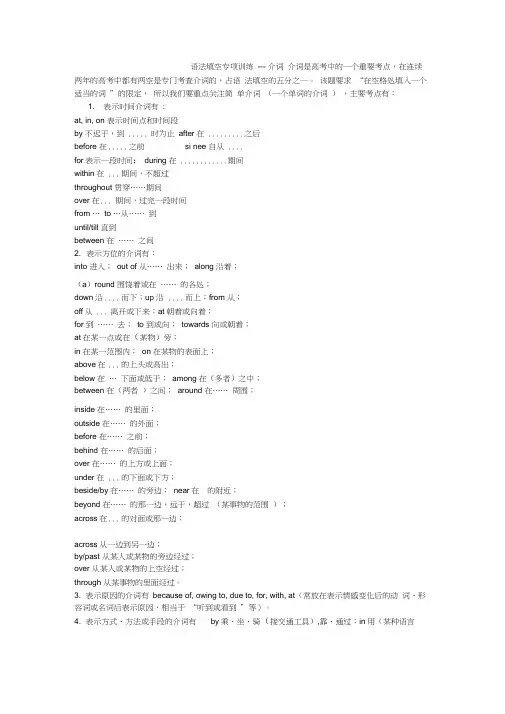
语法填空专项训练--- 介词介词是高考中的一个重要考点,在连续两年的高考中都有两空是专门考查介词的,占语法填空的五分之一。
该题要求“在空格处填入一个适当的词”的限定,所以我们要重点关注简单介词(一个单词的介词),主要考点有:1. 表示时间介词有:at, in, on 表示时间点和时间段by 不迟于,到 ..... 时为止after在 ......... 之后before 在..... 之前si nee 自从 ....for表示一段时间; during 在............ 期间within在 ... 期间,不超过throughout 贯穿……期间over在... 期间,过完一段时间from … to …从…… 到until/till 直到between 在…… 之间2. 表示方位的介词有:into 进入;out of 从…… 出来;along 沿着;(a)round 围饶着或在…… 的各处;down沿.... 而下;up沿 .... 而上;from 从;off从... 离开或下来;at朝着或向着;for 到…… 去;to 到或向;towards 向或朝着;at在某一点或在(某物)旁;in 在某一范围内;on 在某物的表面上;above在... 的上头或高出;below 在… 下面或低于;among 在(多者)之中;between 在(两者)之间;around 在…… 周围;inside 在…… 的里面;outside 在…… 的外面;before 在…… 之前;behind 在…… 的后面;over 在…… 的上方或上面;under在 ... 的下面或下方;beside/by 在…… 的旁边;near在的附近;beyond 在…… 的那一边,远于,超过(某事物的范围);across在... 的对面或那一边;across从一边到另一边;by/past 从某人或某物的旁边经过;over 从某人或某物的上空经过;through 从某事物的里面经过。

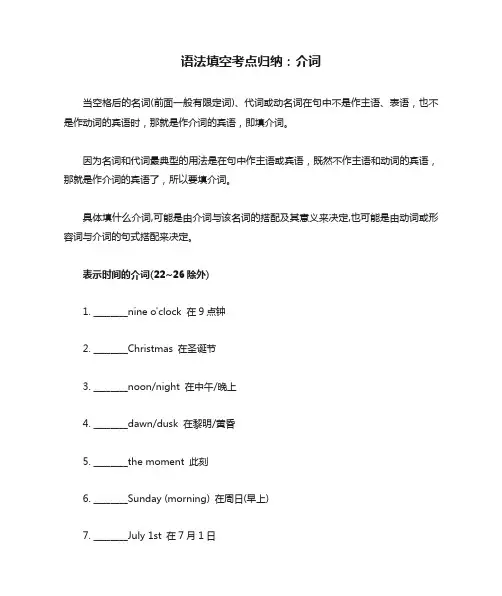
语法填空考点归纳:介词当空格后的名词(前面一般有限定词)、代词或动名词在句中不是作主语、表语,也不是作动词的宾语时,那就是作介词的宾语,即填介词。
因为名词和代词最典型的用法是在句中作主语或宾语,既然不作主语和动词的宾语,那就是作介词的宾语了,所以要填介词。
具体填什么介词,可能是由介词与该名词的搭配及其意义来决定,也可能是由动词或形容词与介词的句式搭配来决定。
表示时间的介词(22~26除外)1. ________nine o'clock 在9点钟2. ________Christmas 在圣诞节3. ________noon/night 在中午/晚上4. ________dawn/dusk 在黎明/黄昏5. ________the moment 此刻6. ________Sunday (morning) 在周日(早上)7. ________July 1st 在7月1日8. ________the following day 在第二天9. ________a clear night 在一个晴朗的夜晚10. ________August 在8月11. ________2015 在2015年12. ________the night of August 1st 2015在2015年8月1日晚上13. ________one time 曾经,一度14. ________the age of 6 在六岁时15. ________the end of 在……的尽头16. ________the same time 同时17. ________times (=sometimes) 有时18. ________once (=immediately) 立刻19. ________present 现在,目前20. ________first 在开始时21. ________last 最后,终于22. ________table 在进餐23. ________work 在工作24. ________school 在上学25. ________least 至少,起码26. ________most 最多,至多动词+介词27.account ________ your absence 说明你缺席的原因28.apply ________ the post 申请这个职位29.approve ________your choice 同意你的选择30.ask ________sick leave 请病假31.belong ________me 属于我的,是我的32.believe ________God 信仰上帝e ________ London 来自伦敦e ________ an old friend 碰见一位老朋友35.depend ________our parents 依靠我们的父母36.deal ________ an awkward situation 处理尴尬的局面37.concentrate________ my studies 全神贯注于学习38.head ________the door 向门口走去39.hunt ________ a lost book 寻找一本丢失的书40.learn ________ one’s mistakes 从错误中学习41.look________the problem 调查这个问题42.look ________the children 照顾这些孩子43.look ________a job 找工作44.lead ________an accident 导致事故45.live________ one’s salary 靠工资生活46.operate ________her 给她动手术47.meet ________ misfortune 遇到不幸48.pay ________the book 给这本书付款49.prepare ________the exam 为考试作准备50.refer________ a dictionary 查词典51.run ________a handsome boy 追求帅哥52.send ________a doctor 请医生来53.search________the missing child 寻找丢失的孩子54.set ________solving the problem 着手解决问题55.suffer ________ headache 患头痛病 stands ________the United States US 代表美国57.serve ________a gardener 做园艺工人58.stick________the rules 坚持按规矩办事59.worry ________personal gain 计较个人得失60.wait ________the opportunity 等待机会动词+副词+介词61.break away ________ a habit 改掉习惯62.get along well ________ him 与他相处很好63.catch up ________ him 赶上他64.put up ________ his cruelty 忍受他的虐待65.go on ________ his story 继续讲他的故事66.look forward ________seeing you 盼望见到你67.get close________ nature 接近大自然68.pay a visit ________the seaside 去海滨游玩69.go in ________sports 爱好运动70.look out ________ pickpockets 小心扒手71.look around ________a room 四处寻找房子72.look down ________ him 瞧不起他73.think highly ________his works 对他的作品评价很高动词+名词+介词74.pay attention________ your spelling 注意你的拼写75.take care________ his elderly parents 照顾他年迈的父母76.take advantage ________the Internet 利用互联网77.make use ________reference books 利用参考书78.make fun ________Mr. Smith 嘲笑史密斯先生79.have trust ________his judgment 信任他的判断80.have difficulty ________ grammar 语法方面有困难81.shake hands ________ us 与我们握手82.catch sight________ a car 一眼瞥见一辆汽车83.get rid ________carelessness 克服粗枝大叶84.take part ________a discussion 参加讨论85.take pride ________her success 为她的成功感到骄傲86.play a part________ 在……方面起作用87.show an interest ________science 对理科感兴趣88.have a talent________ singing 有唱歌的天赋89.have a gift ________ music 有音乐的天赋90.have an effect ________her life 对她的生活有影响91.keep an eye________ that fellow 留意那个家伙92.play a joke ________his colleagues 开他的同事的玩笑93.play a trick ________ him 捉弄他动词+oneself+介词(=be V-ed +介词)94.adapt oneself ________ the new surroundings 适应新环境95.accustom oneself ________ this lifestyle 适应这种生活方式96.devote oneself ________ singing 沉溺于唱歌97.apply oneself ________ learning English 致力于学习英语98.addict oneself ________ drinking 沉湎于饮酒99.abandon oneself ________ sorrow 沉溺于忧伤之中100.bury oneself ________ the books 埋头于读书101.busy oneself ________ the housework 忙于家务be+形容词+介词102.be good ________善于103.be curious ________对……好奇104.be busy ________ sth.忙于某事105.be content ________对……满意106.be satisfied ________对……满意107.be popular ________sb.受某人的欢迎108.be patient ________ sb.对某人有耐心109.be familiar ________熟悉110.be angry ________对……生气111.be tired ________ (=be fed up with)对……厌倦112.be tired ________因……感到疲劳113.be aware ________知道,意识到114.be fond ________喜欢,爱好115.be proud ________以……自豪116.be afraid ________害怕117.be full ________充满118.be accustomed ________习惯于119.be used ________习惯于120.be related ________与……有关121.be equal________等于,能胜任122.be absent ________缺席,未到场123.be different________与……不同124.be absorbed ________专心于125.be interested ________对……感兴趣126.be rich ________富含127.be late ________迟到128.be fit ________适合129.be similar ________与……类似130.be surprised ________对……感到惊讶131.be strict ________ sb.对某人要求严格132.be ashamed ________对……感到惭愧。
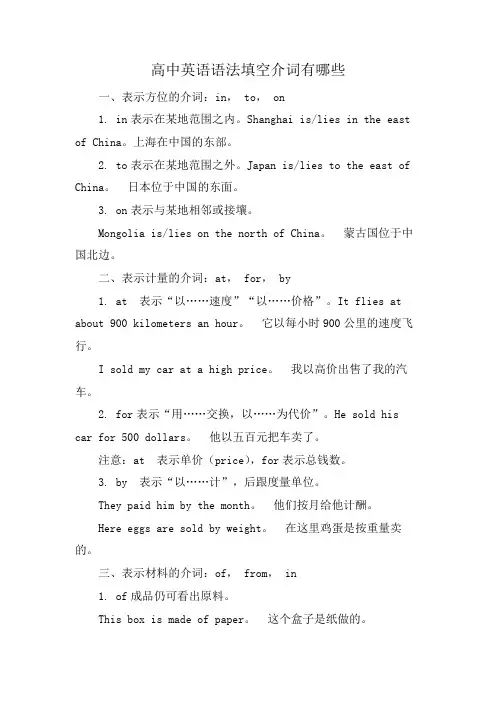
高中英语语法填空介词有哪些一、表示方位的介词:in, to, on1. in表示在某地范围之内。
Shanghai is/lies in the east of China。
上海在中国的东部。
2. to表示在某地范围之外。
Japan is/lies to the east of China。
日本位于中国的东面。
3. on表示与某地相邻或接壤。
Mongolia is/lies on the north of China。
蒙古国位于中国北边。
二、表示计量的介词:at, for, by1. at 表示“以……速度”“以……价格”。
It flies at about 900 kilometers an hour。
它以每小时900公里的速度飞行。
I sold my car at a high price。
我以高价出售了我的汽车。
2. for表示“用……交换,以……为代价”。
He sold his car for 500 dollars。
他以五百元把车卖了。
注意:at 表示单价(price),for表示总钱数。
3. by 表示“以……计”,后跟度量单位。
They paid him by the month。
他们按月给他计酬。
Here eggs are sold by weight。
在这里鸡蛋是按重量卖的。
三、表示材料的介词:of, from, in1. of成品仍可看出原料。
This box is made of paper。
这个盒子是纸做的。
2. from成品已看不出原料。
Wine is made from grapes。
葡萄酒是葡萄酿成的。
3. in表示用某种材料或语言。
Please fill in the form in pencil first。
请先用铅笔填写这个表格。
They talk in English。
他们用英语交谈。
四、表示工具或手段的介词:by, with, on1. by用某种方式,多用于交通。
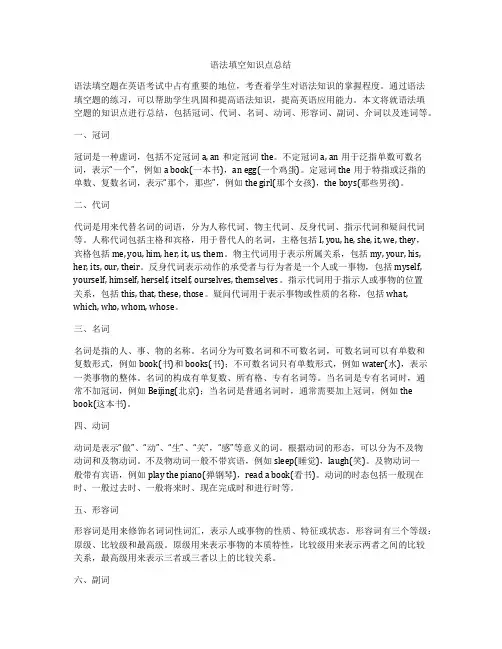
语法填空知识点总结语法填空题在英语考试中占有重要的地位,考查着学生对语法知识的掌握程度。
通过语法填空题的练习,可以帮助学生巩固和提高语法知识,提高英语应用能力。
本文将就语法填空题的知识点进行总结,包括冠词、代词、名词、动词、形容词、副词、介词以及连词等。
一、冠词冠词是一种虚词,包括不定冠词a, an和定冠词the。
不定冠词a, an用于泛指单数可数名词,表示“一个”,例如a book(一本书),an egg(一个鸡蛋)。
定冠词the用于特指或泛指的单数、复数名词,表示“那个,那些”,例如the girl(那个女孩),the boys(那些男孩)。
二、代词代词是用来代替名词的词语,分为人称代词、物主代词、反身代词、指示代词和疑问代词等。
人称代词包括主格和宾格,用于替代人的名词,主格包括I, you, he, she, it, we, they,宾格包括me, you, him, her, it, us, them。
物主代词用于表示所属关系,包括my, your, his, her, its, our, their。
反身代词表示动作的承受者与行为者是一个人或一事物,包括myself, yourself, himself, herself, itself, ourselves, themselves。
指示代词用于指示人或事物的位置关系,包括this, that, these, those。
疑问代词用于表示事物或性质的名称,包括what, which, who, whom, whose。
三、名词名词是指的人、事、物的名称。
名词分为可数名词和不可数名词,可数名词可以有单数和复数形式,例如book(书)和books(书);不可数名词只有单数形式,例如water(水),表示一类事物的整体。
名词的构成有单复数、所有格、专有名词等。
当名词是专有名词时,通常不加冠词,例如Beijing(北京);当名词是普通名词时,通常需要加上冠词,例如the book(这本书)。
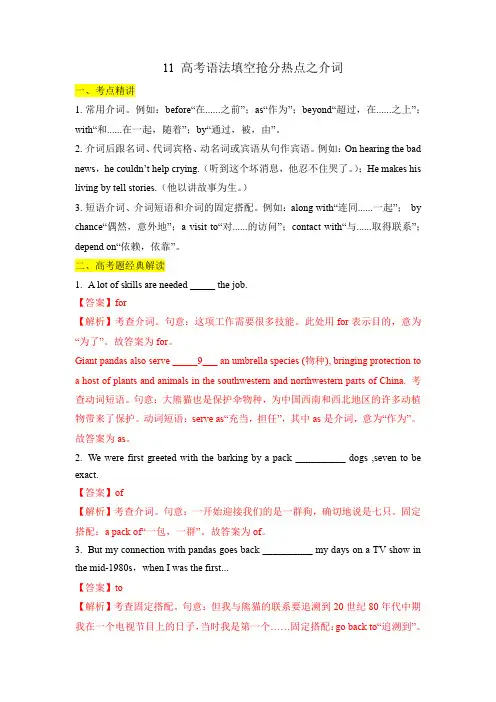
11 高考语法填空抢分热点之介词一、考点精讲1.常用介词。
例如:before“在......之前”;as“作为”;beyond“超过,在......之上”;with“和......在一起,随着”;by“通过,被,由”。
2.介词后跟名词、代词宾格、动名词或宾语从句作宾语。
例如:On hearing the bad news,he couldn’t help crying.(听到这个坏消息,他忍不住哭了。
);He makes his living by tell stories.(他以讲故事为生。
)3.短语介词、介词短语和介词的固定搭配。
例如:along with“连同......一起”;by chance“偶然,意外地”;a visit to“对......的访问”;contact with“与......取得联系”;depend on“依赖,依靠”。
二、高考题经典解读1. A lot of skills are needed _____ the job.【答案】for【解析】考查介词。
句意:这项工作需要很多技能。
此处用for表示目的,意为“为了”。
故答案为for。
Giant pandas also serve _____9___ an umbrella species (物种), bringing protection to a host of plants and animals in the southwestern and northwestern parts of China. 考查动词短语。
句意:大熊猫也是保护伞物种,为中国西南和西北地区的许多动植物带来了保护。
动词短语:serve as“充当,担任”,其中as是介词,意为“作为”。
故答案为as。
2.We were first greeted with the barking by a pack __________ dogs ,seven to be exact.【答案】of【解析】考查介词。
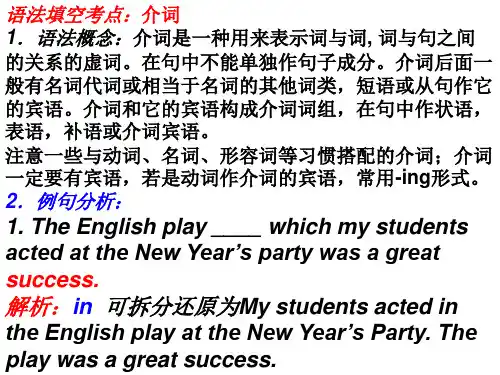
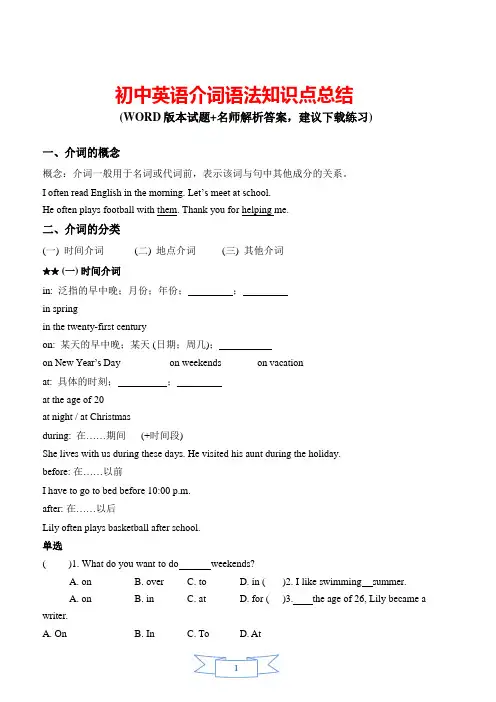
初中英语介词语法知识点总结(WORD版本试题+名师解析答案,建议下载练习)一、介词的概念概念:介词一般用于名词或代词前,表示该词与句中其他成分的关系。
I often read English in the morning. Let’s meet at school.He often plays football with them. Thank you for helping me.二、介词的分类(一) 时间介词(二) 地点介词(三) 其他介词★★ (一) 时间介词in: 泛指的早中晚;月份;年份;;in springin the twenty-first centuryon: 某天的早中晚;某天 (日期;周几);on New Year’s Day on weekends on vacationat: 具体的时刻;;at the age of 20at night / at Christmasduring: 在……期间(+时间段)She lives with us during these days. He visited his aunt during the holiday.before: 在……以前I have to go to bed before 10:00 p.m.after: 在……以后Lily often plays basketball after school.单选( )1. What do you want to do weekends?A. onB. overC. toD. in ( )2. I like swimming summer.A. onB. inC. atD. for ( )3. the age of 26, Lily became a writer.A. OnB. InC. ToD. At( )4. Jim learned to drive ___ the holiday.A. atB. duringC. toD. for( )5. He went to Shanghai July 7, 2013 and came backa cold morning last year.A. in; onB. on; inC. on; onD. in; in( )6. My mom often tells me to go back home dark(黄昏).A. afterB. toC. beforeD. for( )7. A lot of people are here _ vacation every year.A. ofB. onC. atD. with★★ (二) 地点介词1.地点介词 at, in, onat: “在……”(表一个点或小地方)at home at Mr. Cool’s Clothes Storeat the pool at Central Parkin: “在……里” (表一个范围或大地方) in China in Beijing in the water in the parkon: “在……上” (表一个表面,并接触) on the floor on the wall 对比这三个句子:They stood at the door and waited.他们站在门口等着。
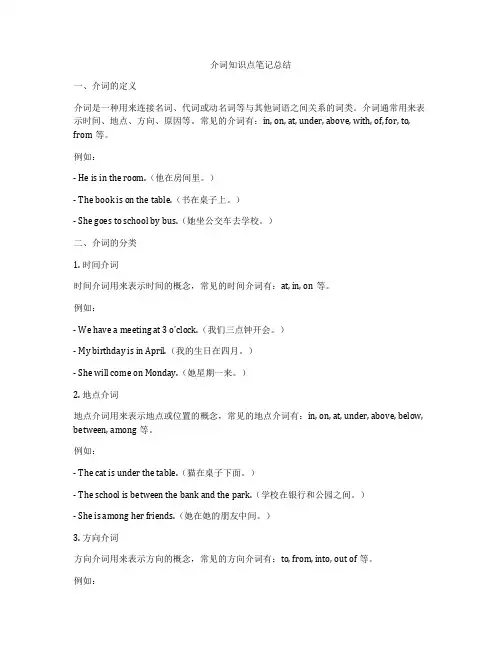
介词知识点笔记总结一、介词的定义介词是一种用来连接名词、代词或动名词等与其他词语之间关系的词类。
介词通常用来表示时间、地点、方向、原因等。
常见的介词有:in, on, at, under, above, with, of, for, to, from等。
例如:- He is in the room.(他在房间里。
)- The book is on the table.(书在桌子上。
)- She goes to school by bus.(她坐公交车去学校。
)二、介词的分类1. 时间介词时间介词用来表示时间的概念,常见的时间介词有:at, in, on等。
例如:- We have a meeting at 3 o’clock.(我们三点钟开会。
)- My birthday is in April.(我的生日在四月。
)- She will come on Monday.(她星期一来。
)2. 地点介词地点介词用来表示地点或位置的概念,常见的地点介词有:in, on, at, under, above, below, between, among等。
例如:- The cat is under the table.(猫在桌子下面。
)- The school is between the bank and the park.(学校在银行和公园之间。
)- She is among her friends.(她在她的朋友中间。
)3. 方向介词方向介词用来表示方向的概念,常见的方向介词有:to, from, into, out of等。
例如:- She goes to school by bike.(她骑自行车去学校。
)- He comes from China.(他来自中国。
)- The cat jumps into the box.(猫跳进箱子里。
)4. 原因介词原因介词用来表示原因或目的的概念,常见的原因介词有:for, because of, due to等。
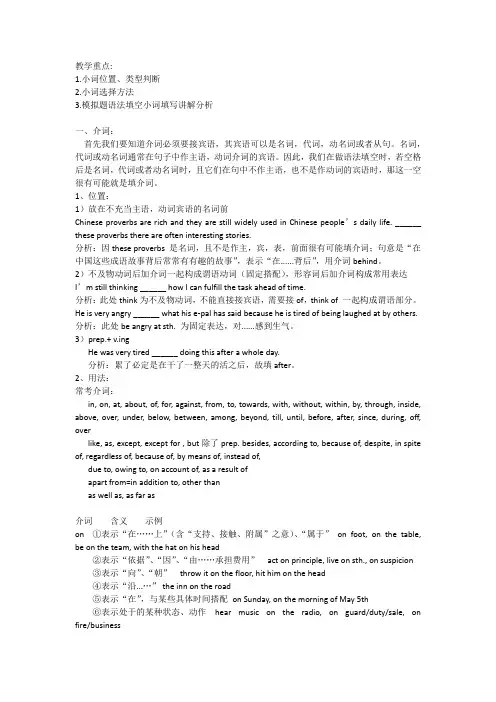
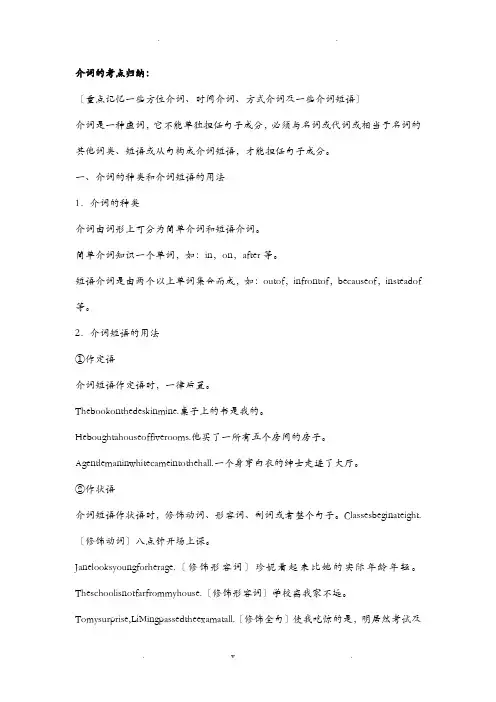
介词的考点归纳:〔重点记忆一些方位介词、时间介词、方式介词及一些介词短语〕介词是一种虚词,它不能单独担任句子成分,必须与名词或代词或相当于名词的其他词类、短语或从句构成介词短语,才能担任句子成分。
一、介词的种类和介词短语的用法1.介词的种类介词由词形上可分为简单介词和短语介词。
简单介词知识一个单词,如:in,on,after等。
短语介词是由两个以上单词集合而成,如:outof,infrontof,becauseof,insteadof 等。
2.介词短语的用法①作定语介词短语作定语时,一律后置。
Thebookonthedeskinmine.桌子上的书是我的。
Heboughtahouseoffiverooms.他买了一所有五个房间的房子。
Agentlemaninwhitecameintothehall.一个身穿白衣的绅士走进了大厅。
②作状语介词短语作状语时,修饰动词、形容词、副词或者整个句子。
Classesbeginateight.〔修饰动词〕八点钟开场上课。
Janelooksyoungforherage.〔修饰形容词〕珍妮看起来比她的实际年龄年轻。
Theschoolisnotfarfrommyhouse.〔修饰形容词〕学校离我家不远。
Tomysurprise,LiMingpassedtheexamatall.〔修饰全句〕使我吃惊的是,明居然考试及格了。
③作表语Heisindanger.他处于危险之中。
Weareagainst/foryou.我们反对/支持你。
Itwasbecauseoftheheavyrain,wecouldn’tgoout.因为这场大雨,我们出不去了。
④作宾语补足语Makeyourselfathome.放松一些,就和在你自己家一样。
Wemadehimoutofdanger.我们使他脱离了危险。
二.表示时间的介词表示年、月、日、时刻等用at,in,on表示时间的前后用in,before,after表示期限等用by,until,till表示期间等用for,during,through表示时间的起点等用from,since表示时间的经过等用in,within1.at、in、on用在时间上的区别:A. at + 钟点/时间点/时间某一时刻(at 9:00, atlunch, atbreakfast, atnoon, at night, atthattime,atthemoment)B. in + 某年/某月/某年某月/某个季节/某个世纪/泛指的早上/下午/晚上inthemorningintheafternoonintheeveninginthe21stcenturyinSeptember ;inMayin1995intheholidayinsummerC. on + 日期/星期/具体的某一天/ 具体的某一天的上午、下午、晚上onMondayonTuesdaymorningonMay4thonacoldnighton a sunny morningonthenightofJuly〔the〕first在七月一日的夜晚注意:表示时间的名词前有this,last,next,every等修饰时,其前面不加介词。
高考英语语法填空常考介词在高考英语语法填空中,介词是常考点之一,这些介词考点常常是考生们易错易混淆的地方。
下面就对每个介词考点进行详细的解释和扩充,帮助考生们更好地掌握这些介词的使用规则。
1. 表示时间的介词:at:常用于表示具体的时间点,如at 8 o'clock,at noon等。
on:用于表示在某一天或具体的某一天的上下午,如on Monday,on the afternoon of July 4th等。
in:用于表示在某个时间段内,如in the morning,in the afternoon等。
at the beginning of:在...的开始。
at the end of:在...的结尾。
in the middle of:在...的中间。
during:在...期间。
2. 表示地点的介词:at:用于表示在某个具体的地点或位置,如at the bus stop,at home等。
in:用于表示在某个建筑物、城市或较大的地理区域之内,如in the classroom,in Beijing等。
on:用于表示在某物的表面或与某物接触的表面,如on the table,on the ground等。
near:在...附近。
by:在...旁边。
between:在...之间。
in front of:在...的前面。
behind:在...的后面。
3. 表示方式的介词:by:用于表示通过某种方式或手段,如by bus,by phone等。
in:用于表示以某种状态或形式存在,如in English,in writing等。
on:用于表示在某种物体或表面上,如on the wall,on the table等。
4. 表示原因的介词:because of:由于...的原因。
due to:由于...的缘故。
这两个介词都可以用来表示原因,但略有区别。
because of更强调直接原因,而due to更强调因果关系。
2014---2021年高考语法填空考点汇编(介词)1. [2021浙江卷] The study found that between 1985 and 2017,by。
考查介词。
固定搭配increase by…增加了……,而increaseto…增加到……。
abundance and a happy home.with。
考查介词。
be associatedwith.是固定搭配,表示“与……有关”。
故填with。
句意:竹类植物与健康、富足和幸福的家庭联系在一起。
3. [2020课标III] The artist was finally humbled (谦卑) by theon。
考查固定搭配。
on earth在世界上。
句意:这位艺术家最终被世界上最伟大的艺术家——大自然母亲所折服。
4. [2020浙江卷1月] This aging of the population isby。
考查介词。
此处根据上下文可知,空处位于表示被动的动词后,故应填by表示“由,被”。
5. [2020浙江卷7月] Some time after 10,000 BC, people madeagriculture.in。
考查介词。
分析结构可知,“they lived_____”应是之前名词the world 的定语从句,定语从句引导词被省略,可推知先行词应是在从句中作宾语,即:they lived inthe world,故填in。
句意:公元前10000年以后,人们第一次真正尝试通过农业来控制他们所居住的世界。
populations have been employed only since the mid-1980s.of/ for。
考查介词。
现代化的跟踪调查北极熊数量的方法在20世纪80年代中期就开始被采用。
methods of/ fordoing sth.做某事的方法。
7. [2019课标III] We were first greeted with the barking byof。
介词填空知识点总结初中一、介词的定义以及基本用法介词是一个虚词,用来标示名词或代词与其他词之间的关系。
一般来说,介词通常位于名词或代词之前,表示时间、地点、方向、原因、目的等概念。
例如:in, on, at, to, from, with 等。
介词的基本用法可以总结为以下几点:1. 表示时间:at, on, inat 用于表示具体的时间点,例如:at 6 o'clockon 用于表示某一天或日期,例如:on Mondayin 用于表示一段时间内,例如:in June2. 表示地点:in, on, atin 用于表示较大的范围内,例如:in the cityon 用于表示较小的范围或表面,例如:on the tableat 用于表示具体的位置,例如:at the bus stop3. 表示方向:to, fromto 用于表示朝向某个地方,例如:go to schoolfrom 用于表示从某个地方出发,例如:come from China4. 表示原因、目的:for, because of, tofor 用于表示目的,例如:for funbecause of 用于表示原因,例如:because of the rainto 用于表示目的,例如:go to school二、常见介词的用法1. inin 用于表示在某个范围或区域内,例如:in the gardenin 用于表示在某段时间内,例如:in the morning2. onon 用于表示在某个表面上,例如:on the wallon 用于表示在某个日期或时间点上,例如:on Monday3. atat 用于表示在某个具体位置上,例如:at the bus stopat 用于表示在某个时刻,例如:at 3 o'clock4. fromfrom 用于表示从某个地方出发,例如:come from China from 用于表示起始点,例如:from Monday to Friday5. toto 用于表示朝向某个地方,例如:go to schoolto 用于表示时间上的延续,例如:from Monday to Friday 6. withwith 用于表示陪同或一起,例如:go to the park with friends with 用于表示用具,例如:cut the bread with a knife三、常见介词的固定搭配1. atat home 在家at school 在学校at the moment 此刻at the same time 同时at the end of 在...的末尾2. inin the morning 在早晨in the afternoon 在下午in the evening 在晚上in the sky 在天空in front of 在...的前面3. onon the table 在桌子上on the wall 在墙上on foot 步行on time 准时on holiday 度假四、介词的错误用法及常见混淆在学习介词时,也要注意一些常见的错误用法和混淆情况:1. between 和 among 的区别between 用于两个事物之间的关系,例如:between you and meamong 用于三个或三个以上事物之间的关系,例如:among the students2. to 和 for 的区别to 用于表示朝向某个方向或目的地,例如:go to schoolfor 用于表示目的,例如:for fun3. in, on, at 的混淆在表示时间、地点、方式时,in, on, at 的用法需要根据具体情况加以区分,例如:in the morning, on the wall, at the bus stop在学习介词的过程中,考虑到初中生的水平和课程要求,以上内容是初步的介词知识点总结。
介词(基础篇)1考点一:方位介词方位介词是表示位置和方向的介词.常用的方位介词有on,over,above,under, below,in,at,about,around,behind,between,among,beside,near等.1.on,over和above的用法on,over和above都有“在…上面”的意思,但这三个调在意义上还是有一些区别的。
(1)on表示两个物体的表面相互接触,例如:There is a plant on the desk.书桌上有一株植物。
(植物紧贴着桌面)(2)over表示“在…的正上方”,两个物体表面没有接触,侧如:A lamp hung over the table.桌子上方挂着一盏灯。
(灯和桌面没有接触)(3)above表示一个物体在另一个的上方,但不一定是在正上方,两个物体之间没有接触。
例如:Look!A lot of birds are flying above the trees.看!许多鸟正在树的上空飞。
2.under和below的用法under和below都有“在…下面”的意思,不过这两个词也是有区别的.(1)under表示“在…的正下方”。
例如:There is a cat under the table.桌子下面有一只猫。
(2)below表示"在…的下面",但不强测是否在正下方,例如:Our classroom is below theirs.我们的教室在他们(教室)的下面。
介词(基础篇)2 3.in的用法in表示"在…里面",也可以用来表示在一个很大的空间内。
例如:There are some books in the box箱子里有一些书。
4.at,about和around的用法at表示"在…旁边",about或around表示"在…周围"。
(1)at表示在某物旁边。